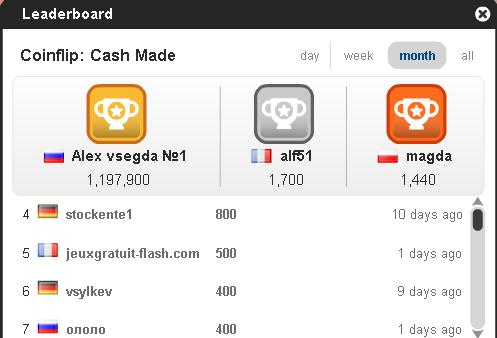You are missing trading opportunities:
- Free trading apps
- Over 8,000 signals for copying
- Economic news for exploring financial markets
Registration
Log in
You agree to website policy and terms of use
If you do not have an account, please register
Then why are you engaging in this blatant bullshit that stupidly pours on the spread?
Isn't that the result?

If this is "bullshit", what do you propose to make money with? I mean a method or a way.Isn't that the result?
If this is "bullshit", how do you propose to make money? I mean method or way .Here played a pyramid game in the tester. The price exceeded the level of order 8. Step 24 p as the leverage is 500. One pyramid yielded 72.3% of initial deposit. But with large stoploss and max drawdown 48.8%. If I had closed my profit later my deposit would have doubled, but I was afraid of possible reversal. Basically, if I decrease start lot twice, my max drawdown will not exceed 25%, I might risk sometimes. A 50% gain is worth it.
Guys, there's a tester. Hands, after all. Create clear rules for entry and exit, test it on at least 300 entries and everything will become clear. Why make a circus?
Not all at once, first you have to feel the pyramid and figure out how it works. And then look for a good entry into the market, albeit rare, but accurate.
It is a result, which has nothing to do with real trading on the stock exchange. Especially, as the fantasist nekola advises - in 12p increments.
It is strange, Aleksander showed in the screenshot a real result in one game, on the basis of this I can assume (with high probability) that he can repeat this result in the vast majority of other games, and at the stock exchange "traders" officially called the Gamblers at the stock exchange.
Can you explain in more detail what volatility is and how to make money from it?
So I checked the variant with cloakroom clerk, blah, the movie "Gentlemen of Fortune" comes to mind at that phrase). Variant with random actions with lots of losing hand after loss
Here is a variant for comparison without any random, so that we may make a conclusion about using random actions. Initial lot $1
Without any randomization of next lot after the loss:
Hand1 max_k_martin = 16384 TotalSum=13929
Hand2 max_k_martin = 32768 TotalTotal=14185
Max_k_martin = 22,000 out of 57,000 coin tosses.
With a random of next lot after the first Loss on a losing hand (10% - lot is discarded to initial; 20% - lot is martinized, 70% - we divide the lot by 2)
Several runs in a row
1)
Random - Hand1 max_k_martin = 4096 TotalSum=2178
Random - Hand2 max_k_martin = 2048 TotalSum=2055
2)
Random - Hand1 max_k_martin = 4096 TotalSum=2204
Random - Hand2 max_k_martin = 2048 TotalSum=2549
3)
Random - Hand1 max_k_martin = 2048 TOTAL=2489
Random - Hand2 max_k_martin = 1024 TotalTotal=2665
4)
Random - Hand1 max_k_martin = 1024 TotalSum=2410
Random - Hand2 max_k_martin = 32768 TotalSum=2452
5)
Random - Hand1 max_k_martin = 4096 TotalSum=2214
Random - Hand2 max_k_martin = 2048 TotalSum=2456
6)
Random - Hand1 max_k_martin = 16384 TotalTotalTotal=2328
Random - Hand2 max_k_martin = 32768 TotalTotal=2421
I also tried variants of including random from 2 to 10 Losses in a row, each one separately, the results are almost the same.
Conclusion: random does not always protect us from huge lots, while our profit decreased 5 times.
Once again I would like to point out that large lots are added after 20000 thousand passes and until the series is reached we can, of course, have our Eldorado for several times. However, Alexander has been doing his bids for a much smaller number of rolls.
Now we may need to add balance raises and pyramids after taking a hand. But something tells me it's not going to work...
Tried to use constant lot pyramiding on the pound's upside rally from 25.08.2020 to 01.09.2020. Got a gain of about 46% with a maximum drawdown of 15.8%. That's pretty good. Closing was performed only by a stop loss.
I decided to use pyramiding with constant lot only, as I am not a supporter of too much risk.
Strangely, Aleksander showed a screenshot of the real result in one game, on the basis of this I can assume (with high probability) that he can repeat this result in the vast majority of other games, but at the stock exchange "traders" officially called the Gamblers at the stock exchange.
Can you explain in more detail what volatility is and how to make money from it?
There's nothing more to talk about.
There is nothing further to talk about.